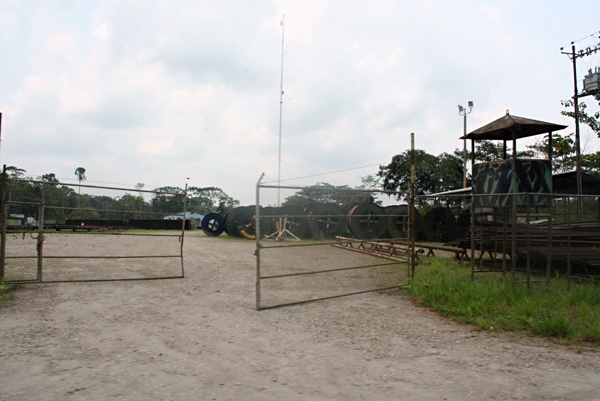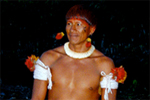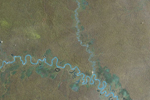
Oil industry infrastructure in the Ecuadorian Amazon. Photo by: Jeremy Hance.
The Inter-American Court of Human Rights has found in favor of a Kichwa community’s right to consultation prior to industrial projects on their land in a ruling that could have implications for many indigenous peoples across the Americas. The court found that the government of Ecuador violated the indigenous people’s rights by allowing the Argentine oil company, Compania General de Combustibles (CGC), on their land without proper consultation.
The Kichwa community of Sarayaku filed the lawsuit in 2006, after CGC, partnering with ConocoPhillips, felled forests, destroyed a cultural site, and drilled hundreds of boreholes for seismic surveying on tribal lands despite never gaining permission to do so from the community. As tensions rose, the Ecuadorian government set up military camps on indigenous land.
Finding in favor of the Sarayaku community, the Inter-American Court of Human Rights ruled that the Ecuadorian government must deal with unexploded explosives left behind by the oil companies and pay reparations for the damage done. Furthermore, the court ruled that in the future the Ecuadorian government must consult indigenous people before granting concessions to industrial companies.
“This sentence will have a far-reaching effect on countries across the region—it makes it crystal clear that states bear a responsibility to carry out special consultation processes before engaging in development projects affecting Indigenous Peoples and their rights,” Fernanda Doz Costa, with Amnesty International, said in a press statement.
The ruling comes as the Ecuadorian government is looking to lease new oil concessions totaling 4 million hectares on indigenous lands later this year.
Related articles
Brazil decree opens tribal lands to mining, dams in ‘national interest’

(07/26/2012) A directive signed Monday by Brazil’s Solicitor-General could hamper the efforts of indigenous tribes to win government recognition of their traditional lands, reports Survival International, a human rights group focused on native peoples. The directive ‘opens up all indigenous areas to mineral, dams, roads, military bases and other developments of ‘national interest’ without the need to consult with or address concerns of indigenous peoples’, according to an expert familiar with the directive.
Indigenous tribes hold 3 engineers hostage over Belo Monte dam
(07/26/2012) Three engineers are being held hostage by the Juruna and Arara indigenous tribes as tensions rise over the on-going construction of the Belo Monte dam in Brazil, reports the Indigenous rights NGO Amazon Watch. The company building the dam, Norte Energia, has confirmed that three of its employees were being held against their will. Tribal groups in the region say the massive dam will upend their way of life, and that construction is already making travel along the Xingu river difficult.
Vietnam buys stakes in controversial oil blocks threatening Peru’s most vulnerable indigenous people

(07/11/2012) Vietnam’s state oil and gas company, PetroVietnam Exploration and Production (PVEP), has announced its intention to acquire a major stake in controversial oil operations in the remote Peruvian Amazon. This area, known as Lot 67, is one of the most biodiverse in the world and home to indigenous people living without regular contact with outsiders, sometimes dubbed ‘isolated’ or ‘uncontacted’, who could be decimated by contact with oil company workers because they are highly vulnerable to disease.
Building indigenous resilience in the face of land-grabbing, deforestation in Malaysian Borneo

(07/10/2012) In the 1980s images of loincloth-clad tribesmen blockading blocking logging roads in Malaysian Borneo shocked the world. But while their protests captured the spotlight momentarily, Borneo’s forests continued to be destroyed at rapid rates, undermining traditional communities that are dependent on these ecosystems for food, shelter, medicine, clean water, and spiritual inspiration. Nomadic tribes are now but a memory in Borneo, but other tribal groups continue to fight for their forests by seeking legal recognition of their lands and blocking destructive projects, including oil palm plantations, logging operations, and large-scale hydroelectric projects. Helping them is The Borneo Project, a Berkeley-based non-profit that works in partnership with indigenous communities and the small non-profits that support them.
Indigenous tribes occupy Belo Monte dam for over 10 days
(07/03/2012) As of Tuesday, the occupation of Belo Monte dam by indigenous tribes entered its 13th day. Indigenous people, who have fought the planned Brazilian dam for decades, argue that the massive hydroelectric project on the Xingu River will devastate their way of life. According to a statement from the tribes, 17 indigenous villages from 13 ethnic groups are now represented at the occupation, which has successfully scuttled some work on the dam.
Sarawak tribe calls on German company to walk away from controversial dam
(06/19/2012) Indigenous people from the Malaysian state of Sarawak have sent a letter to the German company, Fichtner GmbH & Co. KG, demanding that the consulting group halt all activities related to the hugely-controversial Baram dam, reports the NGO Bruno Manser Fund. Critics of the dam and it parent project known as the Sarawak Corridor of Renewable Energy (SCORE) initiative, say the hydroelectric dam will displace 20,000 people and flood 40,000 hectares of primary rainforest.
Indigenous rights rising in tropical forests, but big gaps remain

(05/31/2012) In the last twenty years, rights for indigenous forest dwellers have expanded significantly, according to a new report by the Rights and Resources Initiative (RRI). Covering nearly thirty tropical forest countries, the report finds that indigenous people now hold rights to 31 percent of the forest land in these countries, rising from 21 percent in 1992. However, landmark land rights for indigenous people remain imperiled by lack of enforcement, land-grabbing, government ambivalence, and industrial development. The report comes less than a month before the Rio+20 Summit on Sustainable Development, a meeting of global leaders that marks two decades since the Rio Earth Summit.